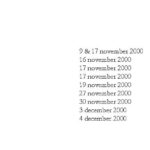Boxing Humans
No Comments yet Well, moving in the academic realm is too often about boxing humans – yes, both sides going together: putting people into boxes and brutally beating them up. The following a letter I sent to relevant newspapers as comment on what is going on, how students [and lecturers] are mal-treated, disrespectful encounters when students are following their curiosity. It makes me increasingly sad, and I feel deeply ashamed …
Well, moving in the academic realm is too often about boxing humans – yes, both sides going together: putting people into boxes and brutally beating them up. The following a letter I sent to relevant newspapers as comment on what is going on, how students [and lecturers] are mal-treated, disrespectful encounters when students are following their curiosity. It makes me increasingly sad, and I feel deeply ashamed …
Dear colleagues,
adding to the various discussions on ranking and formalistic approaches to studying, admission to universities and performance of third-level teaching and research, one point is easily overlooked – the following example is perhaps extreme, though not necessarily completely exceptional.
I worked for two years as professor of economics at Bangor College China, Changsha [BCC] before taking up my current position as research fellow at the Max-Planck Institute for Social Law and Social Policy in Munich, Germany. Still, one persisting bond to the previous job is concerned with writing references for some students. Some universities where students applied, accepted only references, requiring my mail-address from the previous job – but shouldn’t universities at this time and age accept that scholars are moving, following ambitions and calls in other positions? This means: they should also accept that mail addresses change, and one may even prefer to use a non-institutional address. Anyway, I mentioned the BCC-mail address – however, sending a mail to that address is answered by an auto-reply referring the sender to another address. This is the first point where the institution that was seeking the reference – the Graduate School, The Chinese University of Hong Kong – failed. They ignored the auto-reply and I did not know about the request they sent. Finally I was made aware of it [by the bright applying student], checked the dormant mail box and continued to the website for the submission of the reference. A form opened [after going through a more or less cumbersome procedure], asking for replies to multiple choice questions. I still think students are not made up of multiple choice elements, instead: they are real beings, humans with a multifaceted personality that cannot be squeezed into such forms – even when considering data-processing as an at-times appropriate tool. So, instead of ticking the boxes I preferred skipping them, attaching a recommendation letter instead. However, the system did not allow me to submit the letter unless I would first answer the multiple-choice questions which would feed into a one-dimensional profile. I complained, sent the letter as a mail attachment – and did not receive a reply by the said office of the Hong Kong University. At some stage, I agreed – honestly disgusted by the lack of qualification and respect towards students – ticked the boxes and attached the letter [again cumbersome, as one had to enter a code which was not clearly legible, not allowing to distinguish 0 and O]. I sent another letter of complaint to the Graduate School, The Chinese University of Hong Kong – which was again answered to the BCC address, and again they failed to resend the mail to the e-mail address mentioned in the auto-reply.
If these are the standards of entering higher education, one should not be surprised that at the other end, i.e. at the time of finishing studies, many people have difficulties. They feel their creativity being limited by the requirements of publishing, acquiring funding and the competition along lines of subordination under expectations instead of striving for innovation [see Maximilain Sippenauer: Doktor Bologna; Sueddeutsche Zeitung, 20.10.2017: 11]
Still, it is a bit surprising that all this is well known and still not much is changing. Surprising … ? Perhaps it is not really surprising if we consider that the income of top-administration posts increase while the income of lecturers does not follow accordingly [see for instance the article titled: Times Higher Education pay survey 2016 in The Times Higher Education;https://www.timeshighereducation.com/features/times-higher-education-pay-survey-2016%5D.
It seems that there is a long way towards ‘supporting the brightest by open systems’, overcoming the dominantadministrative policy of ‘wedge the narrowest by furthering their smart submission’.
Sincerely
Peter Herrmann
You May Also Like
Comments
Leave a Reply








